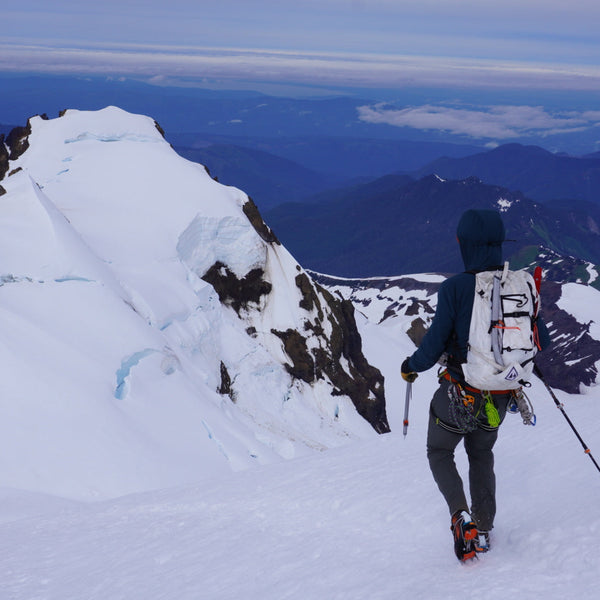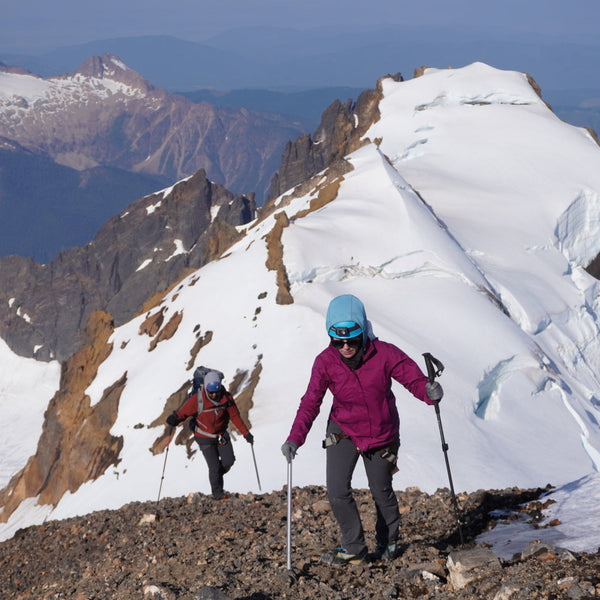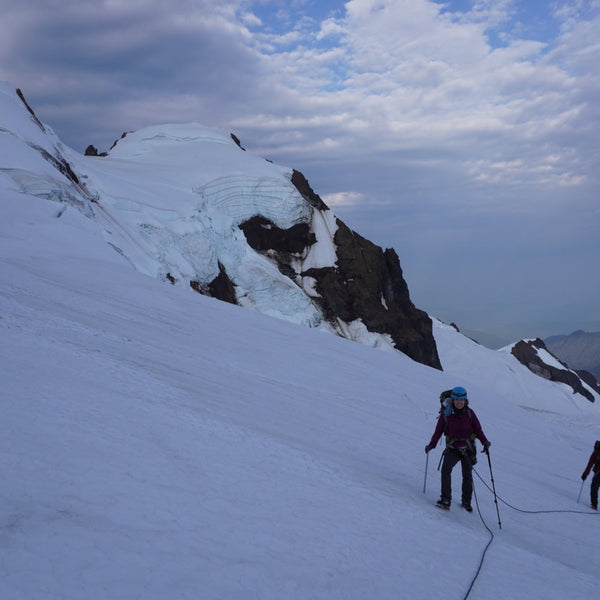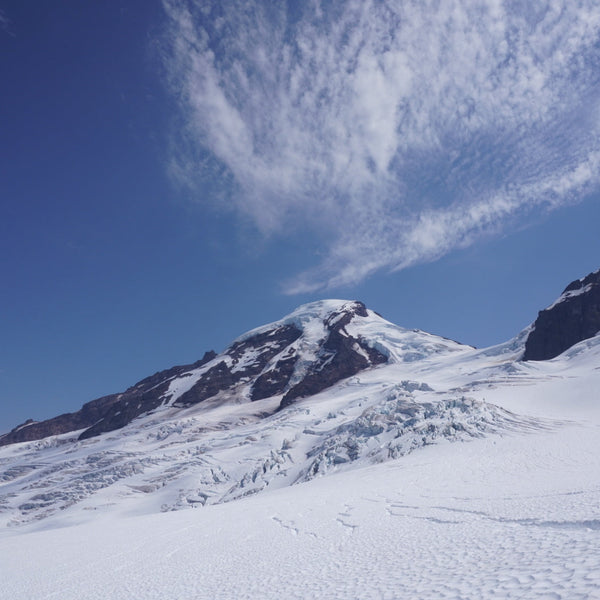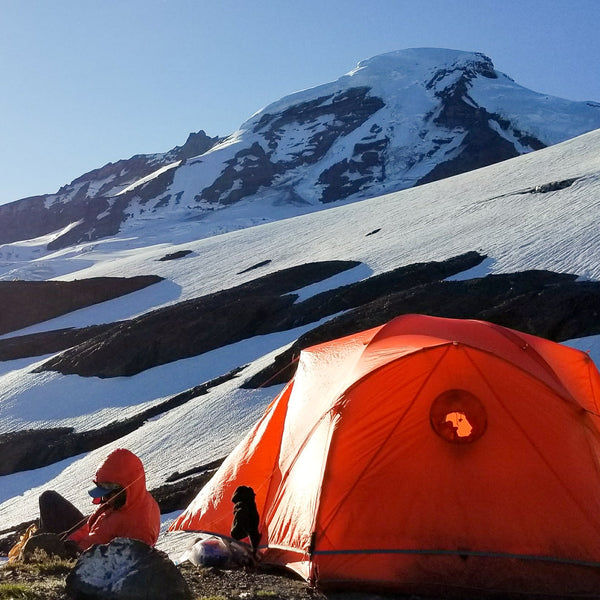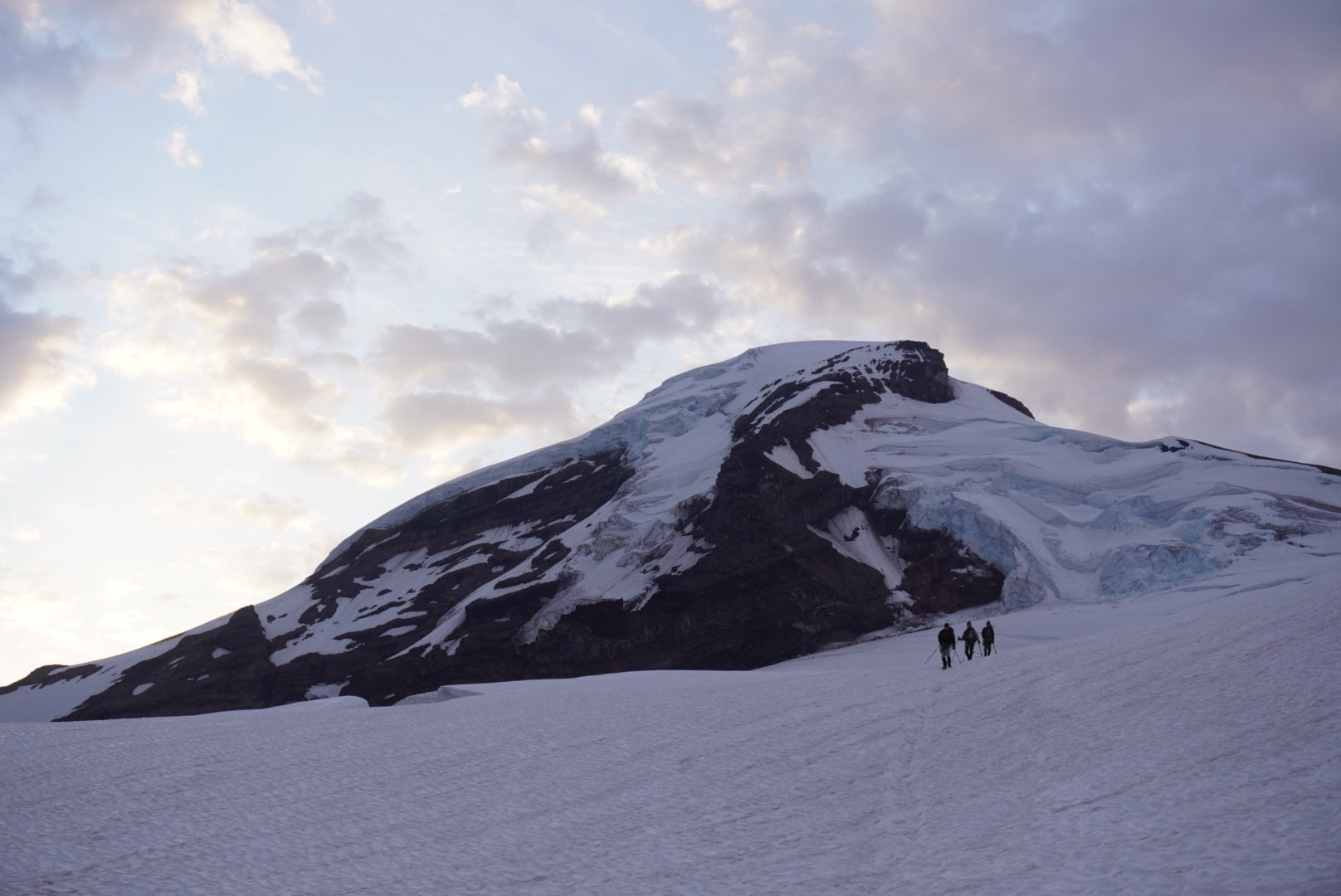
Mt Baker Summit Climb
We'll tackle the following objectives and skills:
- Push Your Limits - Take your alpine climbing to the next level on this glaciated Cascades volcano!
- Route Options Include - Coleman-Deming and Easton / Squawk Glacier Routes.
- Mountaineering Skills Training - Including crampons, ice axe arrest and glacier rope travel
- Summit Attempt - This will be a long day, gaining over 4,000’ of elevation over various snow surfaces and steep slopes.
- Descent - Once we reach our high point, we’ll descend the route back down to camp
This program requires at least 2 participants to run.
Looking for a Private or One Day Summit Climb? Go to Mt Baker Summit Climb - Private.
Here's the schedule for a 3 DAY CLIMB:
- Day 1 - Arrival & Tour to Camp - 8:00 am meetup with your guide in town. We'll do a quick gear check and review the plan for the day. Your guide will discuss the route up to camp and we'll make any final adjustments before we caravan to the trailhead. The rest of the day will be spent hiking to camp and learning about camp craft.
- Day 2 - Mountaineering Skills Training - We'll get an early start on the day, having breakfast with hot coffee or tea, and prepare any food for the day before gearing up and heading out. In this course we'll cover:
- Mountaineering Gear
- Ice Axe Techniques including Self Arrest and
- Team Arrest (for Glacier Travel)
- Crampon Techniques
- Mountaineering efficiency including the Rest Step
- Descending techniques for mountaineering
- Basics of rope team travel
- Day 3 -Summit Attempt 3:00-5:00am quick breakfast followed by an early alpine start. Your guides will set the start time based on warming for the day and the weather forecast. Prepare for a long day, where we gaining over 4,000’ of elevation over various snow surfaces and steep slopes. Once we reach our high point, we’ll descend the route back down to camp. We’ll break down camp, pack up our bags, and descend to the trailhead.
Here's the schedule for a 2 DAY CLIMB:
- Day 1 - Tour to Camp & Mountaineering Skills Review - 8:00am meetup with your guide at the trailhead. We'll do a quick gear check and review the plan for the day then tour to and set up camp. 12:00pm Mountaineering skills review. 5:00pm Dinner and bed.
- Day 2 -Summit Attempt 3:00-5:00am early alpine start with a quick breakfast. Your guides will set the start time based on warming for the day and the weather forecast. Prepare for a long day, where we gaining over 4,000’ of elevation over various snow surfaces and steep slopes. Once we reach our high point, we’ll descend the route back down to camp We’ll break down camp, pack up our bags and descend to the trailhead.
Here are the skills and fitness you'll need for your course:
- Basic Mountaineering Skills - Including ice axe, crampon, and basic rope skills are required for a 2 Day Climb. If you want to build those skills during the program then select a 3 Day Climb or attend our Intro to Mountaineering Skills course prior to attending.
- Strong Fitness - Able to spend a long, active day outside, moving uphill at 1,000’ per hour for durations of 1-1.5 hours between breaks. Participants should be able to hike 8-10 miles, climbing 2,500 - 3,500 vertical feet throughout the course of the day. People with strong fitness typically have a strenuous workout 3-4 days a week.
Here's what's included with your trip:
- Experienced AMGA Trained Guide
- Mt Baker-Snoqualmie National Forest Permit
- Ropes & Gear
- SlingFin Tent
- Stove & Fuel
- Group Safety Gear - your guide will be equipped with snow science tools and a first aid kit
- Wag Bags - for human waste disposal in with compliance 'Leave No Trace' principles
- Meals
- Transportation
- Personal Mountaineering Gear - ice axe, crampons, climbing harness
- Guide Gratuities
Washington Alpine Climbing Gear List
- Avalanche & Mountaineering Gear (beacon, shovel, probe, ice ax, crampon, harness) - Come prepared with your own gear or rent from Blackbird
- Other Mountaineering Gear (sleeping bag, pad, etc.) - Come prepared with your own gear or rent from:
Know Before you go

Blackbird Mountain Guides offers both scheduled group programs and private programs.
Private programs are simply above and beyond what Blackbird Mountain Guides currently has scheduled. Scheduled courses are not always less expensive. Before booking a trip with Blackbird Mountain Guides, clients are encouraged to review the differences between these types of programs, and to decide what works best for them.
SCHEDULED PROGRAMS
Scheduled Programs have fixed dates, itineraries, objectives, curriculum, and costs. They typically appeal to solo individuals or small groups or who are looking to share the cost of their program with a larger group. Correspondingly, scheduled programs are less expensive for smaller groups (1-2), and they provide the opportunity to meet others with similar interests. If you have a large group (3+), Scheduled programs will often be more expensive. They can fill up quickly, and scheduling flexibility is obviously limited.
Scheduled programs will have advertised dates. All scheduled programs can be run as private programs with private dates/rates as well.
PRIVATE PROGRAMS
Private programs have scheduling freedom. They typically appeal to those who would like some flexibility in planning their own trip or course. In this regard, Itineraries and objectives can be tailored to suit current conditions as well as client goals. Private programs are normally less expensive for larger groups (3+). If you have a small group (1-2) private programs will be more expensive.
3 DAY CLIMB
Day 1
8:00am Meet your guide at the trailhead. We'll do a quick gear check and review the plan for the day. The guide will discuss the route up to camp and we'll make any last minute adjustments needed.
8:30am Ascend to camp and build camp.
12:00pm Snow School. In this program we'll cover: Mountaineering Gear, Ice Axe Techniques including Self Arrest and Team Arrest (for Glacier Travel), Crampon Techniques, Mountaineering efficiency including the Rest Step, Descending techniques for mountaineering, Basics of rope team travel
5:00pm Dinner and bed. We’ll review the plan for the following day, pack what we can to prepare, and get to bed early to set ourselves up for an alpine start for the summit attempt!
Day 2
Alpine Start. Your guides will set the time based on warming for the day and the weather forecast. Summit Attempt. This will be a long day, gaining over 4,000’ of elevation over various snow surfaces and steep slopes. Once we reach our high point, we’ll descend the route back down to camp.
Day 3
Break down camp, pack up our bags and descend to the trailhead. We’ll aim to be down by early afternoon.
2 DAY CLIMB
Day 1
8:00am Meet your guide at the trailhead. We'll do a quick gear check and review the plan for the day. The guide will discuss the route up to camp and we'll make any last minute adjustments needed. 8:30 am Ascend to camp and build camp.
12:00pm Skills review. Prior experience is helpful, as we will provide a review of crampons, ice axe arrest and glacier rope travel.
5:00pm Dinner and bed. We’ll review the plan for the following day, pack what we can to prepare and get to bed early to set ourselves up for an alpine start for the summit attempt.
Day 2
Alpine Start. Your guides will set the time based on warming for the day and the weather forecast. Summit Attempt. This will be a long day, gaining over 4,000’ of elevation over various snow surfaces and steep slopes. Once we reach our high point, we’ll descend the route back down to camp. Packing Up Camp and Return to Trailhead. When we get back to camp, we’ll break it down, pack up our bags and descend to the trailhead. We’ll aim to be down by early afternoon.
We'll tackle the following objectives and skills:
- Push Your Limits - Take your alpine climbing to the next level on this glaciated Cascades volcano!
- Route Options Include - Coleman-Deming and Easton / Squawk Glacier Routes.
- Mountaineering Skills Training - Including crampons, ice axe arrest and glacier rope travel
- Summit Attempt - This will be a long day, gaining over 4,000’ of elevation over various snow surfaces and steep slopes.
- Descent - Once we reach our high point, we’ll descend the route back down to camp
This program requires at least 2 participants to run.
Looking for a Private or One Day Summit Climb? Go to Mt Baker Summit Climb - Private.
Here's the schedule for a 3 DAY CLIMB:
- Day 1 - Arrival & Tour to Camp - 8:00 am meetup with your guide in town. We'll do a quick gear check and review the plan for the day. Your guide will discuss the route up to camp and we'll make any final adjustments before we caravan to the trailhead. The rest of the day will be spent hiking to camp and learning about camp craft.
- Day 2 - Mountaineering Skills Training - We'll get an early start on the day, having breakfast with hot coffee or tea, and prepare any food for the day before gearing up and heading out. In this course we'll cover:
- Mountaineering Gear
- Ice Axe Techniques including Self Arrest and
- Team Arrest (for Glacier Travel)
- Crampon Techniques
- Mountaineering efficiency including the Rest Step
- Descending techniques for mountaineering
- Basics of rope team travel
- Day 3 -Summit Attempt 3:00-5:00am quick breakfast followed by an early alpine start. Your guides will set the start time based on warming for the day and the weather forecast. Prepare for a long day, where we gaining over 4,000’ of elevation over various snow surfaces and steep slopes. Once we reach our high point, we’ll descend the route back down to camp. We’ll break down camp, pack up our bags, and descend to the trailhead.
Here's the schedule for a 2 DAY CLIMB:
- Day 1 - Tour to Camp & Mountaineering Skills Review - 8:00am meetup with your guide at the trailhead. We'll do a quick gear check and review the plan for the day then tour to and set up camp. 12:00pm Mountaineering skills review. 5:00pm Dinner and bed.
- Day 2 -Summit Attempt 3:00-5:00am early alpine start with a quick breakfast. Your guides will set the start time based on warming for the day and the weather forecast. Prepare for a long day, where we gaining over 4,000’ of elevation over various snow surfaces and steep slopes. Once we reach our high point, we’ll descend the route back down to camp We’ll break down camp, pack up our bags and descend to the trailhead.
Here are the skills and fitness you'll need for your course:
- Basic Mountaineering Skills - Including ice axe, crampon, and basic rope skills are required for a 2 Day Climb. If you want to build those skills during the program then select a 3 Day Climb or attend our Intro to Mountaineering Skills course prior to attending.
- Strong Fitness - Able to spend a long, active day outside, moving uphill at 1,000’ per hour for durations of 1-1.5 hours between breaks. Participants should be able to hike 8-10 miles, climbing 2,500 - 3,500 vertical feet throughout the course of the day. People with strong fitness typically have a strenuous workout 3-4 days a week.
Here's what's included with your trip:
- Experienced AMGA Trained Guide
- Mt Baker-Snoqualmie National Forest Permit
- Ropes & Gear
- SlingFin Tent
- Stove & Fuel
- Group Safety Gear - your guide will be equipped with snow science tools and a first aid kit
- Wag Bags - for human waste disposal in with compliance 'Leave No Trace' principles
- Meals
- Transportation
- Personal Mountaineering Gear - ice axe, crampons, climbing harness
- Guide Gratuities
Washington Alpine Climbing Gear List
- Avalanche & Mountaineering Gear (beacon, shovel, probe, ice ax, crampon, harness) - Come prepared with your own gear or rent from Blackbird
- Other Mountaineering Gear (sleeping bag, pad, etc.) - Come prepared with your own gear or rent from:
Epic Reviews From Adventurers
the blackbird difference
We’re here to help. Our FAQs or Gear Lists might have the information you’re seeking. But If you’re not finding the information you need, we’d be happy to help!
